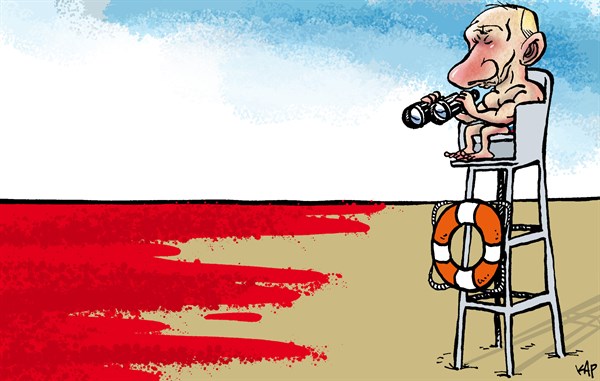
Western officials who pronounce themselves puzzled about Vladimir Putin's intentions in Syria are missing some big clues. There is a clear model for the campaign Russia is pursuing on behalf of Syrian dictator Bashar al-Assad, a legacy that is Putin's pride: Chechnya.
The Muslim republic in the North Caucasus and the decade-long war that Putin launched there in September 1999 have mostly been forgotten by the outside world since the dictator installed there by Putin, Ramzan Kadyrov, consolidated control in the late 2000s. But the Kremlin regards it as a "good, unique example in history of (the) combat of terrorism," as Dmitry Medvedev, Putin's prime minister, put it. Chechnya, Medvedev said last year, is "one of the business cards of Russia."
What are the components of this winning formula? First, define all opposition to the prevailing regime as terrorist, indistinguishable from the most extreme jihadists. That enables a fundamental political aim: to eliminate alternatives. In Syria today, moderate and secular opposition forces arguably are getting harder to find. That wasn't the case in Chechnya in 1999. The country's nationalist president, Aslan Maskhadov, had won a democratic election, defeating an Islamist opponent by 59 to 23 percent. His predecessor, Dzhokhar Dudayev, was so secularized that he was unaware how many times a day Muslims pray.
Russia killed them both, along with every other moderate Chechen leader it could find, both at home and abroad. One was murdered in Vienna; another in Dubai. When Western leaders pressed Putin to negotiate with Maskhadov and other secular moderates, he invariably responded angrily. "Would you invite Osama bin Laden to the White House . . . and let him dictate what he wants?" he demanded of one group of Western visitors.
It should be no surprise that Russia's first Syria bombings have been aimed at the remnants of the moderate opposition. It's not just that they are backed by the United States; they represent a viable alternative to the Assad regime, and so, under Chechnya rules, must be eliminated. "He doesn't distinguish between (the Islamic State) and a moderate Sunni opposition that wants to see Mr. Assad go," President Barack Obama said after meeting Putin at the United Nations. "From their perspective, they're all terrorists."
The first stages of the Russian military campaign in northern Syria have followed a familiar pattern. Heavy bombing and shelling of civilian areas preceded scorched-earth sweeps, just as in Chechnya. According to a report on Chechnya by the International Crisis Group, "war crimes and crimes against humanity committed by (Russian) troops" included "indiscriminate shelling and bombing, secret prisons, enforced disappearances, mass graves and death squads." One common tactic, the report said, was "taking insurgents' relatives as hostages, subjecting them to torture or summary execution and burning their homes."
In short, Assad's forces and their Lebanese and Iranian allies may have to step up their already-notorious brutality to match Putin's tactics in Chechnya. But they may have expert help: Kadyrov has asked Putin to send his 20,000-member personal army, known as the "kadyrovtsy," to Syria. The state propaganda outlet Russia Today quoted him as saying he wanted "to go there and participate in special operations."
Kadyrov and his relationship with Putin offer another lesson to those wondering whether Putin is prepared to dispose of Assad - a prospect that Obama has repeatedly bet on. The Chechen strongman is, if anything, more sinister than the soft-spoken Assad; Kadyrov is known to do his own killing and torturing on occasion. He has solidified a cult of personality in Chechnya, extorts tribute from every business and citizen, and brazenly orders hits on his critics, from journalists and human rights activists to Russian politicians. Many believe him responsible for the murder of Russian opposition leader Boris Nemtsov, gunned down near Red Square last winter.
Putin's response has been to offer Kadyrov not just tolerance but full protection. The Crisis Group reports that senior Russian security officials tried to undermine the Chechen by arresting his gunmen for the Nemtsov murder. Putin rebuffed them, awarding Kadyrov a medal immediately after the hit. "Unless President Putin's reputation is seriously damaged by his protégé, the rules of the game are unlikely to change," concluded the report. The same rules will apply to Assad.
Obama's principal response to Putin's new offensive has been to predict that the result will be "a quagmire." But Putin has heard that before. For years Western leaders warned him that the war in Chechnya was unwinnable, that the only solution was political. Putin nevertheless persisted through a decade and more of bloody fighting that cost Russia at least 6,000 military casualties and Chechnya uncounted tens of thousands. The result was the pacification he now trumpets as a "calling card." Don't expect him to give up anytime soon on a similar result in Syria.
Comment by clicking Diehl is deputy editorial page editor for The Washington Post.
"> here.

 Contact The Editor
Contact The Editor
 Articles By This Author
Articles By This Author
